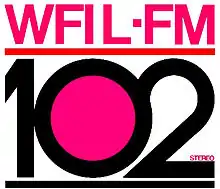WIOQ
WIOQ (102.1 FM) is a commercial radio station in Philadelphia, Pennsylvania. The station broadcasts a Top 40 (CHR) radio format and is owned by iHeartMedia. The studios and offices are on Presidential Boulevard in Bala Cynwyd.[2] The station carries several nationally syndicated shows, including Elvis Duran and the Morning Show.[3]
 | |
| City | Philadelphia, Pennsylvania |
|---|---|
| Broadcast area | Greater Philadelphia |
| Frequency | 102.1 MHz (HD Radio) |
| Branding | Q102 |
| Slogan | Philly's #1 Hit Music Station! |
| Programming | |
| Language(s) | English |
| Format | Top 40/CHR |
| Subchannels |
|
| Ownership | |
| Owner | iHeartMedia (iHM Licenses, LLC) |
| WDAS, WDAS-FM, WISX, WRFF, WUSL | |
| History | |
First air date | February 10, 1942 (as W53PH)[1] |
Former call signs | W53PH (1942–1943) WFIL-FM (1943–1971) |
Former frequencies | 45.3 MHz (1941–1948) 99.9 MHz (1945–1948) |
Call sign meaning | IOQ looks like 102 Q resembles 2 in Cursive Writing |
| Technical information | |
| Facility ID | 20348 |
| Class | B |
| ERP | 27,000 watts |
| HAAT | 204 meters (669 ft) |
Transmitter coordinates | 40°02′37.4″N 75°14′30.6″W |
| Links | |
| Webcast | Listen live (via iHeartRadio) |
| Website | q102 HD3: Listen Live |
WIOQ has an effective radiated power (ERP) of 27,000 watts. The transmitter is located off Wygard Avenue in the Roxborough section of Philadelphia. (40°02′37″N 75°14′31″W)[4] WIOQ broadcasts using the HD Radio hybrid format, with the HD2 digital subchannel airing Russian language "DaNu Radio" and the HD3 subchannel carrying iHeart's LGBTQ national format "Pride Radio" with some local programming as well.[5]
History
WFIL-FM
The Federal Communications Commission granted WFIL Broadcasting Company a construction permit for a new FM station on February 4, 1941.[6] The station signed on for the first time with the call sign W53PH on February 10, 1942, broadcasting at 45.3 MHz[1] on the original FM band, which covered 42 to 50 MHz. The station mostly simulcast the programming of its AM sister station 560 WFIL. The FCC granted the station its first license on September 9, 1942.[6] On November 1, 1943, the station was assigned the WFIL-FM call sign.[1] After the FCC created the current FM band on June 27, 1945,[7] the FCC granted temporary authority for operation on 99.9 MHz beginning on December 29, 1945.[6]
The station's license was assigned to Triangle Publications, effective March 1, 1946. At the time WFIL 560 AM was owned by Triangle Publications, which published the Philadelphia Bulletin daily newspapers and TV Guide magazine. WFIL-FM mostly simulcast the AM station in its early years.
The FCC issued a new construction permit on June 10, 1946 for permanent operation on 99.9 MHz. However, on June 27, 1947, the FCC reallocated the station to 102.1 MHz and authorized temporary operation on the new frequency. On February 5, 1948, the FCC granted Triangle Publications permission for the station to cease broadcasting on 45.3 MHz. A new construction permit was issued by the FCC for permanent operation on 102.1 MHz on September 29, 1948, followed by a new license on January 4, 1950.[6] By the 1960s, WFIL-FM had been airing separate classical music shows, breaking away from the AM simulcast.
Popular 102
On July 10, 1968, WFIL-FM switched away from classical music to an early version of a soft adult contemporary format. Known as "Popular 102," the station featured softer pop music of the day with a mix of currents, oldies and instrumentals. Each hour included a track from a featured album of the week, and voices on the station were pre-recorded announcements and news from the staff at sister station WFIL, including Jay Cook, J.J. Jeffrey, Tommy Tyler and news from Allen Stone and Glenn Barton.

The station promoted itself as playing "The Nicest Music for the Nicest People." This format continued through May 1971, when Triangle Publications decided to sell its Philadelphia broadcasting stations.[8]
Album Rock Format
In 1971, Triangle Publications sold WFIL-AM-FM-TV to Capital Cities Broadcasting (later Capital Cities Communications). In turn, WFIL-FM 102.1 was spun off to Richer Communications in May 1971. The call letters were changed to WIOQ representing the script version of the frequency "102." The familiar jingle of Popular 102 was also changed to "W102." Initially, the familiar PAMS jingles were updated to reflect the new call letters and the station continued as before. By 1972, the station's imaging changed to Stereo Island which trended even softer than the station had been, but added live DJs while the music rotated on an IGM automation unit.

Air staff at this time included Jeff Dean, Lee Meredith, Art Andrews, Alan Drew (Frio), Jere Sullivan, and Jay Mathieu, with Dave Klahr continuing as program director. After a year or so in this format, the station brought back the Popular 102 moniker and started playing a slightly more uptempo mix of pop tunes. When Dave Klahr left, Roy Laurence was hired as program director and the station's mix became Top 40-based with a more adult presentation than co-owned 560 WFIL.
Gradually the music became more rock-oriented, and by about 1975 WIOQ had a progressive rock format. Around this time the station began using an extract from the album Intergalactic Trot by Stardrive as the music bed for hourly station IDs. It would remain WIOQ's audio signature for over a decade.

The station also started using the moniker "Q102" during that time. For a time in the mid-'70s, the station affiliated with ABC's "American FM Radio Network" in order to air some programs hosted by then-hip Geraldo Rivera. That contract also required the station to air the network's ABC news at :15 past the hour, as its competition was playing music. The station had trouble competing with established FM rock leader 93.3 WMMR and aggressive AOR upstart 94.1 WYSP. Programming duties were split between Alex DeMers and Bill Fantini, with DJs Jim Harlan, John Harvey, and Bill Paul rounding out the full-time air staff. After a few years, the owner (by then listed as Que Broadcasting, Inc.) declared bankruptcy. WIOQ emerged from the bankruptcy under the ownership of The Outlet Company, a retail and broadcasting firm based in Providence, Rhode Island.
Adult Rock Era
Under Outlet, WIOQ evolved into an eclectic music format described as "adult rock". The station played a blend of softer songs heard on rock music stations, some deeper album cuts, a few top 40 crossover hits, and a bit of uptempo jazz. Leading air personalities on WIOQ in this era included John Harvey ("Harvey in the Morning"), Helen Leicht who hosted a show called "Breakfast With The Beatles" on Sunday mornings, David Dye, Ed Sciaky and Michael Tozzi. (Leicht and Dye later joined the adult alternative public station WXPN. The former hosted "Leicht Lunch" program at noon, and Dye is the producer and host of the nationally distributed World Cafe.)
After a proposed sale of Outlet's broadcast properties to Coca-Cola's Columbia Pictures subsidiary around 1982 fell through, the station group was acquired by Wesray Capital Corporation, a corporation partially owned by former Treasury Secretary William E. Simon.
Solid Gold 102
After years of low to moderate ratings, on November 10, 1987, at 6 a.m., adult rock was dropped in favor of an oldies format. WIOQ began playing the hits of 1955-1973 and positioning the station as "Solid Gold 102".[9] Harvey Holiday, formerly of WDAS-FM, hosted the station's morning show.
While WIOQ was changing its format, CBS-owned 98.1 WCAU-FM switched from a top 40 format to also play oldies as WOGL. Within a matter of days, Philadelphia went from having no oldies FM station to having two. CBS had been putting the oldies format on a number of its FM stations around the U.S., based on the success of WCBS-FM in New York City. WIOQ had trouble competing for the same oldies audience as WOGL.
Q102 goes CHR
In 1988, WIOQ was sold to EZ Communications. On January 18, 1989, at 7:18 a.m., the station dropped oldies and switched to a Rhythmic/Dance-leaning Top 40 format, branded as "Q102." The first song under the new format was "Let's Go Crazy" by Prince and The Revolution.[10]
The station leaned toward dance and urban material, but played some of rock and pop crossover songs, changing according to chart trends and competitive conditions. In 1994, urban rival WUSL was bought by EZ, forming a sales and demographic combo where WUSL targeted African-American listeners, while WIOQ targeted more of a Caucasian and Latino audience. In 1996, EZ merged with American Radio Systems. To satisfy ownership limits (as well as taking advantage of a larger advertising market), WIOQ and WUSL were traded to Evergreen Media (owner of WJJZ), with EZ receiving Evergreen's Charlotte stations in return. In February 1997, Evergreen and Chancellor Media merged. After the Chancellor acquisition, WIOQ became co-owned with WYXR (now WRFF), WDAS, WDAS-FM, WUSL, and WJJZ (now WISX). By early 1998, the station evolved to Mainstream CHR.
As a result of a large merger in 2000, WIOQ and the other stations in its cluster became properties of Clear Channel Communications. Clear Channel later changed its name to iHeartMedia.
References
- "The Beginning of FM Broadcasting in Philadelphia". broadcastpioneers.com. 2007. Retrieved 2016-12-14.
- Q102.com/contact
- Q102.com/schedule
- "FM Query Results for WIP-FM". fcc.gov. Federal Communications Commission. Retrieved 2016-12-14.
- InsideRadio.com
- "History Cards for WIOQ". fcc.gov. Federal Communications Commission. Retrieved 2020-05-15.
- "In the Matter of Allocation of Frequencies to the Various Class of Non-Governmental Services in the Radio Spectrum from 10 Kilocycles to 30,000,000 Kilocycles (Docket No. 6651)" (PDF). fcc.gov. Federal Communications Commission. June 27, 1945. Retrieved 2016-12-09.
- "Billboard". 1968-07-20.
- http://www.americanradiohistory.com/Archive-RandR/1980s/1987/RR-1987-11-13.pdf
- http://www.americanradiohistory.com/Archive-RandR/1980s/1989/RR-1989-01-27.pdf
External links
- The official WIOQ (Q102) website
- WIOQ in the FCC's FM station database
- WIOQ on Radio-Locator
- WIOQ in Nielsen Audio's FM station database
- DaNu Radio (HD2)
